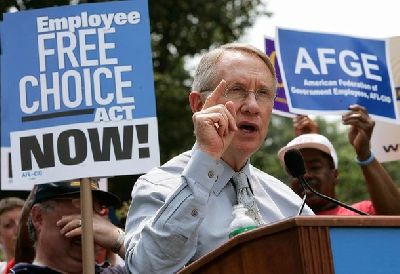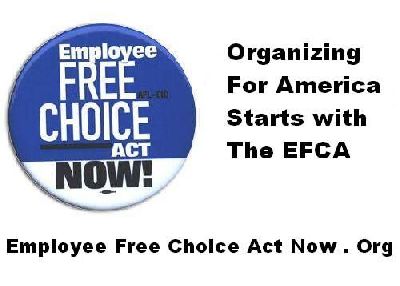Baltimore IMC : http://www.baltimoreimc.org
News :: Labor
Reid: Vote on Employee Free Choice Act card check bill, a labor priority, likely in summer
Washington — Senate Majority Leader Harry Reid said the Senate will likely turn its attention this summer to the Employee Free Choice Act — the union organizing bill being watched in Las Vegas and across the nation.
Standing beside fair-pay advocate Lilly Ledbetter late last week after the Senate passed landmark legislation named in her honor, Reid made clear that the wage discrimination bill was not the last on the labor agenda.
The union organizing bill, sometimes called card check, is an “important piece of legislation,” he said. “We’re going to get to that,” Reid said. “We’re hoping to get to it sometime this summer.”
The Senate will be where the action is on the Employee Free Choice Act. The bill passed the House in 2007, but died on a near-party line vote after only one Republican crossed over to support it in the Senate. With an expanded Democratic majority under Reid, it could be closer to passage.
The bill would make it easier for unions to organize and would likely bring union representation to workers at the remaining casinos on the Strip still without it.
The legislation would allow workers interested in forming a union to simply sign a card, returning to a system that had been in place for decades, until business persuaded Congress to require secret-ballot elections.
The secret ballots could still be used, but the new bill would provide the option of organizing with the sign-up cards. Unions say management often drags out the elections, using the time to pressure workers to vote no.
But business is mounting a fierce campaign to preserve the secret ballot.
The Employee Free Choice Act is the top issue for both the business and labor communities in Washington. Each side plans to spend $10 million on ads and other campaign efforts.
Reid’s announcement of a possible summer vote is timely.
Unions had initially pressed President Barack Obama to make the bill an early part of his 100-days agenda. Union organizing had been key to his reelection, and one branch of the labor community mounted a campaign for follow-through on campaign promises.
Yet corralling the votes necessary for passage in the Senate is also critical.
Even though Democrats have expanded their majority to just one or two votes shy of the 60 needed to defeat a filibuster blocking the bill, support among senators is not a given. Some Democratic senators who initially voted in favor have since expressed reservations about the bill.
For More Information on EFCA please visit our website and blog
www.employeefreechoiceactnow.org
efcanow.blogspot.com/
www.FreeChoiceActNow.Org
www.LaborUnionResources.Org
www.spfpa.org/UnionBusterPagemakerBrochure.pdf
Views
Information
Search
This site made manifest by dadaIMC software



